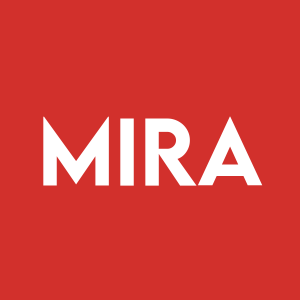Mira Pharmaceuticals Announces Promising Results for MIRA-55 in Multiple Preclinical Tests Compared to THC
Rhea-AI Summary
MIRA Pharmaceuticals (Nasdaq: MIRA) has announced promising results from preclinical studies of its novel oral pharmaceutical marijuana analog, MIRA-55. The compound, being studied as a potential treatment for anxiety and cognitive decline, showed significant advantages over THC in multiple tests.
Key findings include:
- Higher efficacy at CB1 and CB2 cannabinoid receptors compared to THC
- More pronounced and sustained agonist activity as concentration increases
- Consistent, dose-dependent reduction in anxiety-like behaviors
- Maintained efficacy across a broader range of doses
- Promising toxicological profile, indicating potential safer profile for human use
These results confirm MIRA's earlier beliefs about MIRA-55's pharmacological profile and its potential for enhanced potency and efficacy in treating neurological and neuropsychiatric disorders.
Positive
- MIRA-55 showed higher efficacy at CB1 and CB2 cannabinoid receptors compared to THC
- MIRA-55 demonstrated more consistent and stronger anxiolytic effects than THC in preclinical tests
- MIRA-55 maintained efficacy across a broader range of doses without losing effectiveness
- Preclinical studies indicate a potentially safer toxicological profile for MIRA-55 compared to THC
Negative
- MIRA-55 is still in preclinical stage and requires further studies before advancing to human trials
- The company has not yet filed an Investigational New Drug (IND) application for MIRA-55
News Market Reaction – MIRA
On the day this news was published, MIRA gained 25.59%, reflecting a significant positive market reaction.
Data tracked by StockTitan Argus on the day of publication.
Testing confirms MIRA's preliminary beliefs regarding potential treatment for neurological and neuropsychiatric disorders
MIAMI, FL / ACCESSWIRE / July 15, 2024 / MIRA Pharmaceuticals, Inc. (Nasdaq:MIRA) ("MIRA" or the "Company"), a pre-clinical-stage pharmaceutical development company, today announced promising new findings from recent preclinical studies of its novel oral pharmaceutical marijuana analog, MIRA-55, which is being studied as a potential treatment for anxiety and cognitive decline.
The new data confirms MIRA's earlier beliefs regarding MIRA-55's pharmacological profile and potential for potency and efficacy. Importantly, however, the new preclinical data compared MIRA-55 directly to THC, the main psychoactive component in marijuana, and showed promising results.
Background on MIRA1a and Discovery of MIRA-55
MIRA initially focused its marijuana analog preclinical study program around an oral compound called "MIRA1a." As previously disclosed in March 2024, in late 2023, MIRA, based on discussions with its contract manufacturers, began to suspect that MIRA1a was in fact a new molecule with a distinct chemical structure, which MIRA named "MIRA-55". This discovery led to the filing by MIRA of a global provisional patent application for MIRA-55 in March 2024. At that time, MIRA indicated its belief that MIRA-55 displayed enhanced potency and potential for efficacy over MIRA1a but noted that additional testing was required to confirm MIRA's preliminary beliefs. The new testing results announced today provide such confirmation.
Recent Findings on MIRA-55
The recent preclinical studies, conducted in vitro and through a mouse model, confirm that MIRA-55 offers significant potential advantages over THC. MIRA-55 showed higher efficacy at both the CB1 and CB2 cannabinoid receptors compared to THC. It also demonstrated a more pronounced and sustained increase in agonist activity as the concentration increases, indicating the potential for greater effectiveness in activating key cannabinoid receptors responsible for its therapeutic effects. These results confirmed MIRA's belief that MIRA-55 could potentially provide stronger and more reliable relief for conditions like anxiety and cognitive decline.
Additionally, MIRA-55 appears to maintain a novel balance between its activity on the CB1 and CB2 receptors, which may support its effectiveness over a broader range of doses. Unlike THC, which tends to lose its effectiveness at higher doses, these results demonstrate that MIRA-55 appears to maintain robust efficacy as doses increase. This sustained activity means that MIRA-55 could provide more consistent and prolonged therapeutic benefits, making it a more promising candidate for its target indications.
In studies exploring its potential anxiolytic properties, MIRA-55 showed a consistent, dose-dependent reduction in anxiety-like behaviors. In the Open Field Test and Elevated Plus Maze Test, MIRA-55 demonstrated a more predictable and stronger anxiolytic effect compared to THC. MIRA-55 increased the time spent by testing subjects in the center of the field and open arms of the maze, suggesting reduced anxiety. THC, while effective, showed more variable and less consistent results.
Summary of Results: MIRA-55 vs. THC
The recent studies showed the following:
Enhanced Efficacy: MIRA-55 showed significantly improved efficacy over THC at both the CB1 and CB2 cannabinoid receptors, with stronger and more sustained activity.
Consistent Anxiolytic Effects: MIRA-55 consistently reduced anxiety-like behaviors, outperforming THC in the Open Field and Elevated Plus Maze tests.
Stability and Balance: Unlike THC, MIRA-55 maintained efficacy across a broader range of doses without losing effectiveness.
Reduced Side Effects: MIRA-55 demonstrated a promising toxicological profile, indicating a potential safer profile for human therapeutic use.
Erez Aminov, CEO and Chairman of MIRA Pharmaceuticals, added, "We are thrilled with these results and the confirmation of our earlier beliefs regarding the potential impact of MIRA-55 in the pharmaceutical industry. Our dedication to developing innovative treatments continues to drive our research and development efforts. We will be conducting additional preclinical studies to advance us closer to an Investigational New Drug (IND) application for MIRA-55."
Dr. Itzchak Angel, Chief Scientific Advisor to MIRA Pharmaceuticals, commented, "Together with earlier studies showing a good toxicology profile, these findings highlight a significantly differentiated pharmacological profile for MIRA-55. This profile could translate into great therapeutic potential, providing more effective treatment options for patients suffering from neurological and neuropsychiatric disorders with lower toxicities and side effects typically associated with THC."
About MIRA Pharmaceuticals, Inc.
MIRA Pharmaceuticals, Inc. (Nasdaq:MIRA) is a pre-clinical-stage pharmaceutical development company with two neuroscience programs targeting a broad range of neurologic and neuropsychiatric disorders. MIRA holds the exclusive U.S., Canadian, and Mexican rights for Ketamir-2, a novel, patent-pending oral ketamine analog under investigation to potentially deliver ultra-rapid antidepressant effects, providing hope for individuals battling treatment-resistant depression, major depressive disorder with suicidal ideation, and post-traumatic stress disorder.
In addition, MIRA's novel oral pharmaceutical marijuana analog, MIRA-55, is currently under investigation for treating adult patients suffering from neuropathic pain as well as anxiety and cognitive decline, often associated with early-stage dementia. MIRA-55, if approved by the FDA, could mark a significant advancement in addressing various neuropsychiatric, inflammatory, and neurologic diseases and disorders.
The U.S. Drug Enforcement Administration's scientific review of Ketamir-2 and MIRA-55 concluded that each would not be considered a controlled substance or listed chemical under the Controlled Substances Act and its governing regulations. These conclusions remove potential complications for manufacturing, pre-clinical development, IND submission, clinical development, and ultimately commercialization of these drug candidates.
For more information, visit www.mirapharmaceuticals.com.
Ketamir-2 and MIRA-55 are in early-stage preclinical development. There is no assurance that the products will proceed through development or will receive FDA approval for marketing.
Cautionary Note Regarding Forward-Looking Statements
This press release contains "forward-looking statements," which are statements other than historical facts made pursuant to the safe harbor provisions of Section 27A of the Securities Act of 1933, as amended, and Section 21E of the Securities Exchange Act of 1934, as amended. These statements may be identified by words such as "aims," "anticipates," "believes," "could," "estimates," "expects," "forecasts," "goal," "intends," "may," "plans," "possible," "potential," "seeks," "will," and variations of these words or similar expressions. Any statements in this press release that are not historical facts may be deemed forward-looking statements. These forward-looking statements include, without limitation, statements regarding the anticipated benefits of the study results described herein, MIRA-55's potential in treating certain mental health conditions, and the timing for further preclinical and clinical studies and FDA submissions related to MIRA-55. Forward-looking statements are based on the Company's current expectations, estimates, and projections only as of the date of this release and are subject to a number of risks and uncertainties (many of which are beyond the Company's control) that could cause actual results to differ materially from those set forth in or implied by such forward-looking statements. These and other risks concerning the Company's programs and operations are described in detail in the Annual Report on Form 10-K for the year ended December 31, 2023, and other SEC filings, available at www.sec.gov and the Company's website at www.mirapharmaceuticals.com/investors/sec-filings. The Company explicitly disclaims any obligation to update any forward-looking statements except as required by law.
Contact;
Office: 813.505.0282
Email: myanez@mirapharma.com
SOURCE: MIRA Pharmaceuticals, Inc.
View the original press release on accesswire.com







